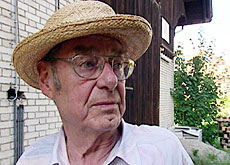Historian reveals tragedy of Swiss child trade

Slave labour, beatings, sexual abuse, fear and isolation were the norm for thousands of “Verdingkinder”, or "discarded children", who were given away or sold as cheap labour until the 1950s.
Historian Marco Leuenberger told swissinfo that the time has come for reappraisal of this dark episode.
Leuenberger was ten years old when his father first told him of his childhood as a discarded child. Also aged ten, his father had to endure the daily grind of getting up at 5am and working until late into the night.
Inspired by his father and thousands of children like him, Leuenberger in 1991 embarked on a huge research project to explore this dark chapter in Switzerland’s history.
The discarded children were usually orphans, illegitimate or came from the poorest families and they were either given away or sold to farmers.
“Most of these children were used as cheap labour, exploited physically or even sexually abused,” Leuenberger concludes in his study.
Leuenberger and other historians are calling for a nationwide research project to be carried out into the trade in “Verdingkinder”, while many of these former child labourers are still alive.
swissinfo: Were children given away or sold throughout Switzerland?
Marco Leuenberger: Yes, especially in German-speaking Switzerland in the Protestant cantons, though also in Catholic areas. It also happened in [French-speaking] canton Vaud. It is also known that children from [Italian-speaking] canton Ticino were sent to work as chimney sweeps in northern Italy.
swissinfo: How many of these ‘Verdingkinder’ were there?
M.L.: For years, the trade involved more than 10,000 children [every year]. But it’s very difficult to come up with an estimate because there is no evidence available prior to 1820. There were also lots of children who were traded without the knowledge of the local authorities.
swissinfo: How did Swiss authorities manage this child trade?
M.L.: Poor families were forced to register with their local authority every year. It was then decided whether all the family members were [adequately] provided for. Authorities in the 19th century had the right to separate the poorest families.
There were no criteria that [farmers] had to fulfil to receive a “Verdingkind”. They only had to prove that they needed more cheap workers.
swissinfo: Why did the authorities turn a blind eye to the abuses committed against these children?
M.L.: There was a different perspective at the time. Today we speak about children’s rights and children’s right to education. But those kinds of considerations didn’t figure in the 1800s. Lots of children had to work. Poverty was a huge problem at the time.
And even though there were critics of the system even back then, these were voices in the wilderness.
swissinfo: Did these children suffer physically from the work they had to do?
M.L.: That was often the case. They were often given too little to eat [which stunted their growth].
There were also emotional scars. Lots of these discarded children couldn’t cope with adult life. Statistics show that many of them turned to crime.
swissinfo: And these children were also often sexually abused?
M.L.: I found dozens of cases of sexual abuse in court files, most of which never became public. The problem was usually solved by moving the child to another place.
The people who committed these acts were sometimes fined, but never imprisoned.
swissinfo: Did some rejected children complain or rebel?
M.L.: Some tried to, but they usually didn’t find anyone willing to listen.
swissinfo: Children were auctioned off in some places as late as the 1930s. How were these auctions allowed to happen in “free” Switzerland?
M.L.: It’s not possible to explain that. And an explanation wasn’t required at the time.
swissinfo: Some former Verdingkinder, along with historians and politicians, are calling for a historical reappraisal of this subject. What progress has been made?
M.L.: We want to carry out a nationwide research project, which would take up to three years. But so far we haven’t found any support. We could work jointly with the universities or look for private financing.
swissinfo: What are the main obstacles?
M.L.: There are very few sources available. Local authorities and archives only show the bare figures and there are very few written accounts from the victims. That’s why we launched an appeal on Swiss television for former rejected children to come forward.
swissinfo: There’ve also been calls for some form of compensation for these injustices.
M.L.: At the very least, local authorities should acknowledge the errors committed in the past. And they should issue an apology to all former Verdingkinder.
swissinfo: Do you think that these former Verdingkinder will live to see their suffering acknowledged?
M.L.: I hope so. I’m confident, even though there’s been no definite support for our project yet. We cannot tackle this alone.
swissinfo-interview: Renat Künzi (translation: Vanessa Mock)
Tens of thousands of “Verdingkinder” (discarded children) were given away as cheap labour from the early 1800s until the 1950s in Switzerland.
Around 6,000 children were given away every year in canton Bern between 1850 and 1900.
There were 10,000 registered “Verdingkinder” in 1910.
Verdingkinder were mostly the orphaned children of unmarried or divorced mothers and poor families.
Farmers received a maintenance fee from local authorities to provide food and shelter for the children.
But in practice, many children were malnourished and overworked. Some were beaten or even sexually abused by their host families.
The child labour trade was managed by local authorities, some of which even held public auctions for the child workers.

In compliance with the JTI standards
More: SWI swissinfo.ch certified by the Journalism Trust Initiative


You can find an overview of ongoing debates with our journalists here. Please join us!
If you want to start a conversation about a topic raised in this article or want to report factual errors, email us at english@swissinfo.ch.